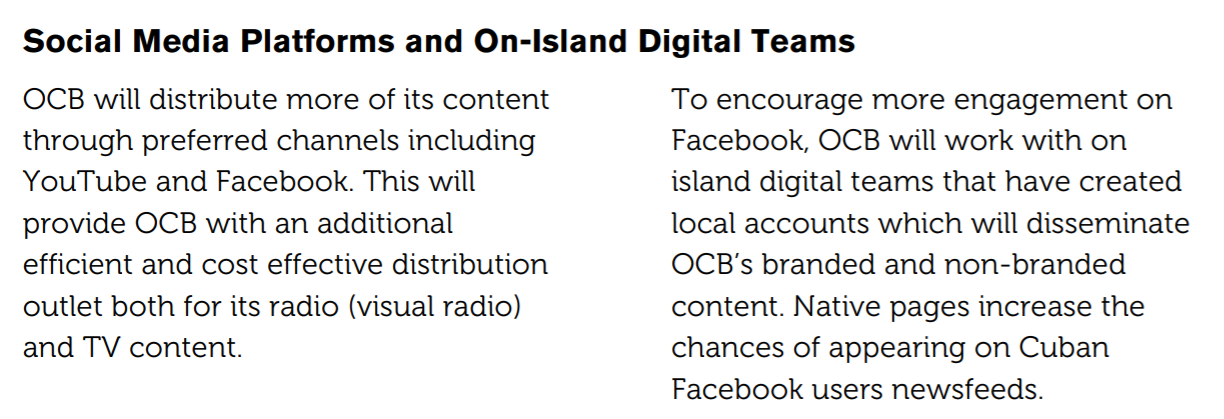Earlier this month, Facebook unveiled something of a watershed moment when it came to social media interference operations. As Facebook revealed, hundreds of fake accounts — including those pushing Scottish secession — had been traced back to Iran, including some tying directly to Iran’s main propaganda organ, Press TV.
With the revelation, it was clear that Facebook fakery — and fake accounts on other platforms, from Instagram to Twitter — was no longer the limited to Russia alone. Other actors had watched Russia’s success, and were looking to follow suit.
And now, another government has been outed as planning to push inauthentic Facebook accounts to spread mixtures of news and opinion to unwitting audiences: the United States.
As the Miami New Times revealed last week, the U.S. had “put together its own plans to use Facebook to foment dissent clandestinely[.]” The target? Cuba.
The revelations, however, didn’t come from government insiders or those on the ground in Cuba exposed to fraudulent Facebook accounts. Rather, the details of the planned accounts were buried in the most recent “Congressional Budget Justification[s]” from the U.S. Broadcasting Board of Governors (BBG), which oversees outlets like Voice of America, Radio Free Asia, and Radio Free Europe/Radio Liberty. The BBG, which recently changed its name to the U.S. Agency for Global Media, also oversees the U.S. Office of Cuba Broadcasting (OCB) — which, as the documents show, had planned to create a network of fraudulent Facebook accounts throughout Cuba.
The most recent budget justification report, for instance, highlights a “dramatic shift within digital to a social media 1st strategy.” As part of that shift, the OCB was “establishing on island digital teams to create non-branded local Facebook accounts to disseminate information.” But the strategy wasn’t limited to Facebook alone — as the document continues, “the same strategy will be replicated on other preferred social media networks.”

But this year’s report wasn’t the first mention of the OCB’s planned foray into the fake Facebook space. Last year’s report likewise highlighted plans for fraudulent Facebook pages to “disseminate OCB’s branded and non-branded content.” According to the report, the local Cuban Facebook accounts that would share this “non-branded content” had already been created. The rationale for the fake Facebook pages? “Native pages increase the chances of appearing on Cuban Facebook users newsfeeds.”

It’s unclear what happened to these fake Facebook pages — namely, because no one seems willing to say much about the program. BBG spokesperson Nasserie Carew told ThinkProgress that the program of Facebook fakes, and the plans to extend to other social media networks in Cuba, “is no longer in progress.” Carew added that the program “wasn’t something planned during [the] watch” of current OCB director Tomas Regalado. Carew said she would pass along ThinkProgress’ questions to the OCB, but ThinkProgress heard nothing back. The former head of OCB, Andre Mendes — who was at the center of what Foreign Policy described as a “coup attempt” at BBG earlier this year — also did not respond to ThinkProgress’ request for comment.
The rationale behind the U.S. plans to inject fake Facebook accounts into Cuban discourse is relatively straightforward; the 2017 BBG budget justification report noted that “Facebook is the preferred social media website for Cubans.” (Facebook did not respond to ThinkProgress’ questions, and it’s unclear if the social media giant was aware of the BBG’s plans.) But as Carew told the Miami New Times, the program was “not like Russian trolling or anything like that.”
Still, the playbook seems almost identical to the Russian and Iranian operations unearthed over the past year: state-based, or at least state-adjacent, entities pushing content meant to sow dissent to unsuspecting Facebook users. To be sure, the content of these posts is, presumably, significantly different than those crafted by Russian and Iranian operatives — and Cuba remains a one-party dictatorship, where political and media freedoms remain effectively nonexistent.
But given all of the concerns, justified or otherwise, about Russian and Iranian social media interference over the past year, there’s a certain irony in the United States co-opting the tactics to its own ends. Or maybe there’s no irony at all: after all, with Iran creating one of the most popular Scottish independence pages, and Russia creating fake Facebook pages with more followers than movements like Black Lives Matter or groups like the Texas Republican Party, crafting Facebook fakes is a low-cost way of reaching a wide range of unsuspecting audiences.
Given the proven success of other fake Facebook operations, it should be little surprise that American authorities were considering aiming the playbook Russia perfected at Cubans. The content may have been different, but a fake Facebook account is still a fake Facebook account, “non-branded” or otherwise.


